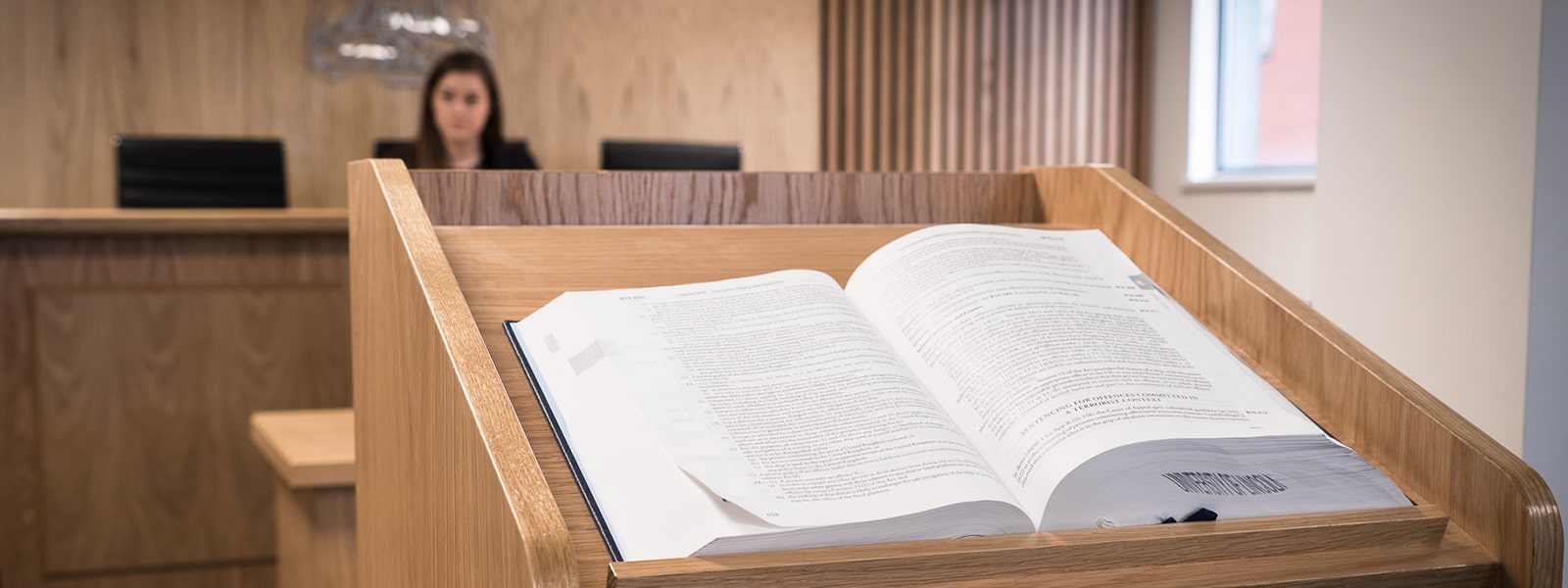Module Overview
The aim of this module is to provide students with an opportunity to build on skills they are expected to have developed in the previous two years through other subjects such as legal reasoning and problem solving. Initially, students can be introduced to the doctrine, maxims and remedies of Equity but the main emphasis will be upon the nature of a trust which has always been the principal concern of Equity.
The classification, nature and creation of various types of express and implied trusts can be considered together with the appointment, powers and duties of trustees. The law relating to charitable trusts may also be examined and the module aims to conclude with an investigation of the implications of a breach of trust.
Module Overview
This module aims to introduce students to alternative dispute resolution and mediation specifically. Students can learn the advantages of alternative dispute resolution over litigation and the principles of mediation. Students are able to explore theories of conflict and conflict resolution as well as use practical role plays to demonstrate the effectiveness of mediation. Students can gain not only theoretical knowledge, but practical application of mediation techniques to resolve disputes. The module will examine the legal framework for alternative dispute resolution as well as recent developments such as government proposals to make alternative dispute resolution compulsory for claims up to £10,000 by the end of 2024.
Module Overview
This module will support students in developing their knowledge of a range of perspectives on the policy process and how analyse relevant policy case studies.
It places emphasis on important models and perspectives and explores a range of current ideas which have a significant impact upon the making and implementation of policy, such as the concept of partnership, notions of participation, and issues of accountability.
Module Overview
This module will look at the practical application of company law principles. The module will be taught by means of a practical guided simulation, spanning the lifetime of a business. It will address different business structures and enable students to both identify differences and choose the media most applicable to their client’s requirements.
The module will also encompass key business transactions and the reporting and filing requirements. Taxation and accounts relevant to the different business media will also be covered.
The importance of business planning and marketing strategies will be addressed, with a view to enabling students to appreciate the issues faced by businesses in the ‘real world’.
Finally, students will be presented with problem-based scenarios in relation to an insolvent business and will be required to consider the various options and liabilities.
Module Overview
This module gives students an opportunity to explore the law in England relating to the care and welfare of children by exploring topics such as the state in family life, care proceedings, special guardianship and adoption, and medical decisions for children.
Module Overview
This module is designed to look at the practical application of the law in respect of civil litigation. Building on their knowledge of contract and torts, students will look at the professional responsibilities of solicitors to their clients and to their regulator. Students have the opportunity to consider what information is needed to progress a case through the Court, considering witness evidence, formal drafting requirements and key elements of Courtroom etiquette.
Module Overview
The aim of this module is to give students the opportunity to explore what has been described as a dynamic area of law. The module seeks to examine specific areas of consumer law, much of which has been influenced by the rapid expansion of consumer law legislation emanating from the European Union. The module gives students the opportunity to explore the intricacies, any inconsistencies, and issues of policy involved in particular areas of consumer protection law.
Module Overview
Contemporary Media Law focuses on the intersectionality of law within a particular sector of modern society. The module aims to introduce students to a range of specific areas of substantive law applying to media businesses across different mediums. Students can examine areas including, freedom of expression, duties of care, privacy law, intellectual property, consumer law, and competition law, together with an overriding theme of regulation and regulatory enforcement, with these areas of law being discussed in the context of topical, controversial, or developing areas of modern media practice.
Module Overview
Employment law is a complicated yet dynamic area of study subject to rapid and constant change. The aim of this module is to examine critically the sources and institutions of employment law which attempt to regulate and support relations between employers and employees.
The study of this module will also give the students an opportunity to appreciate the impact of European Law and Human Rights Law on UK national law in this area. The module seeks to concentrate on the employment relationship, issues of discrimination in the workplace, equal pay, equality in the workplace and termination of employment. Further, this module provides students with an opportunity to develop not only knowledge and understanding of the technical law relating to aspects of employment but also the opportunity to examine ethical, contemporary and perhaps controversial issues in this field.
Module Overview
The aim of the European Union Law module is to develop students' understanding of the Constitution and Institutions of the European Union and, in particular, the constitutional principles, the administrative and procedural law, and substantive policies of the European Union.
Students will be given the opportunity to develop an understanding of the relationship between European Union law and national law; and to appraise the principles of supremacy and direct effect, and the principles of interpretation and Member State liability. The role and jurisdiction of the Court of Justice of the European Union can be examined concerning enforcement, preliminary rulings and judicial review.
Students will have the opportunity to develop an understanding of substantive European Union law through the study of the free movement of goods and workers; the freedom to move and reside of citizens of the Union; social policy and equality of treatment and pay in employment; and, in an area of freedom, justice and security, the European arrest warrant and migration and asylum issues.
Module Overview
This module gives students the opportunity to explore family law as it applies in England and Wales.
Module Overview
The aim of this module is to introduce students to the dynamic, constantly evolving area of international law. Students will have the opportunity to study legal rules which operate in a much broader theatre than national law, with the aim of helping them develop a greater understanding of a changing world order. The module seeks to examine both theoretical and practical applications of International Law and aims to provide students with ample scope for research and independent study.
Module Overview
This module is designed to introduce students to the historical origins of English law. Students will have the opportunity to critically analyse the historical development of key legal institutions and principles, critiquing the rationale for why the law developed as it did, and reassessing the impact of the law on those who did not write it, including women, minority groups, and religious communities.
The module will be taught through a series of case studies, allowing students to explore the key event, the legal principles that are relevant to the event, and how the law developed as a result. Wherever possible, the students will be introduced to primary historical sources, allowing them to engage in source criticism and understanding biases both in contemporary sources and in later evaluations of those sources.
Module Overview
The module enables students to experience law in practice, applying their legal knowledge and research skills to factual legal problems in a clinical setting.
Students will interview real clients, research both legal and practical solutions to the issues identified in order to achieve the clients’ goals and will advise accordingly, in writing, on the options available.
The module is designed to provide students with an opportunity to take their legal knowledge out of the classroom and to give them an insight into how their theoretical studies relate to the practical application of law. The module aims to develop practical lawyerly skills (interviewing, writing and presentation skills).
Selection for the module will be based predominately on level 2 grades and attendance. Depending upon demand, written submissions and/or interviews may be considered.
Module Overview
The Law Dissertation module aims to provide the student with an opportunity to undertake a substantial piece of investigative academic work on a chosen area of law or a law-related topic. The dissertation may develop ideas encountered in other modules or it may be concerned with matters outside such modules. The end product, a piece of written work approximately 12,500 words in length, should demonstrate, in the context of existing knowledge, understanding, critical analysis and original thinking as well as general academic and communication skills.
In addition to providing academic opportunities, the dissertation is also designed to provide the student with the opportunity to develop practical skills such as (depending on the topic and methodology adopted) interviewing technique, questionnaire design and information retrieval. The language of submission of the dissertation will be English language for all students.
Module Overview
This module is designed to provide students with an opportunity to evaluate the political and sociological issues affecting the practice of law and how law can operate as a business.
In recent years, law firms have faced many challenges, for instance:
- Firms have been subjected to increasing regulation in the form of money laundering requirements, and outcome based regulation, whilst others have seen the latter as a relaxation of standards.
- Newcomers to the legal marketplace, with the advent of ‘Alternative Business Structures’ have challenged the traditional delivery of legal services.
- The drastic reduction of public funding for cases (legal aid) has stifled the cash flow of many high street practices and medium size practices which had based its business model on that particular income stream.
- Leading firms have faced insolvency, a situation almost unheard of before the current decade.
- Increasing fees in Courts and Employment Tribunals have reduced the availability of claimant work.
- Direct public access to Counsel challenges the traditional solicitor/barrister partnership model. Students will be encouraged to view legal practice in a business and regulatory context and develop commercial awareness around the practical pressures and difficulties faced by firms operating in the current legal market place.
Module Overview
This module aims to complement the substantive modules of the law degree course, and the litigation processes covered in the common law subjects. Although in the main it aims to concentrate on criminal evidence, the rules relating to civil evidence may be examined where appropriate. The rules on admissibility of evidence and judicial discretion aim to supplement the Criminal Law module students will have the opportunity to make a contrast between exclusionary rules in criminal and civil law.
Module Overview
This module is designed to introduce students to the law in England and Wales relating to wills, intestacies, the administration of estates and tax planning. The module aims to place a strong emphasis on the practical application of relevant law to factual situations and on the effect of such application upon the interests of the parties involved.
Module Overview
This module enables students to experience law in a workplace setting. Students can either arrange their own suitable work experience (one half day per week or equivalent, as agreed in advance with module co-ordinators) or will be allocated a placement by the module coordinator.
Students will be expected to evaluate the workplace structure and the key roles within it. Students will have the opportunity to consider any regulatory impacts on the organisation (including the roles of the Compliance Officers for Legal Practice (COLPs) and for Finance and Administration (COFAs), where relevant), the recruitment and marketing policies, as well as exploring the application of theoretical legal knowledge to on-going legal problems.
Module Overview
Penology is the study of the penal system. While some diversionary sentences can be given at the police station, the majority of this module will consider sentencing in the context of the Magistrates’ and Crown Court in England and Wales. The lectures will start by looking at penal theory, discussing why we sentence people who commit crime and considering what we are trying to achieve before looking at the sentencing rules and practices in the criminal courts. The module will then go on to consider the sentences delivered by the court, including nominal and financial penalties, the community order, and a custodial sentence. How a person experiences prison will be considered in addition to how this impacts on children and families. Finally, students can consider a range of offender groups including children, women, and dangerous offenders.
Module Overview
This module is designed to focus upon the processes of policy making and implementation at both practical and theoretical levels. It aims to provide students with an introduction to a variety of models of policy making and seeks to discuss the complexities of the distribution of power and decision making, primarily, but not limited to, the field of social policy.
Module Overview
This module considers how to engage with children and families to assess and respond to needs and how to make professional judgements in decisions to safeguard and promote children’s welfare. A further key theme is working in partnership both with children and families and other agencies, considering how, in practice this can best be promoted at different levels and stages of decision-making.
Emphasis will be on current research and developments. This module will be of particular value to students as a preparation for making career choices and to enhance their employability.











